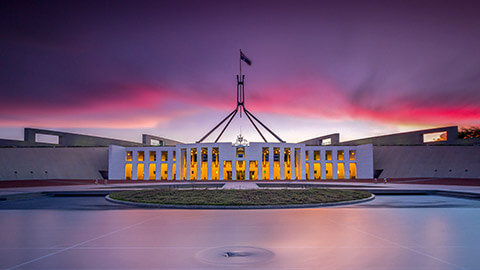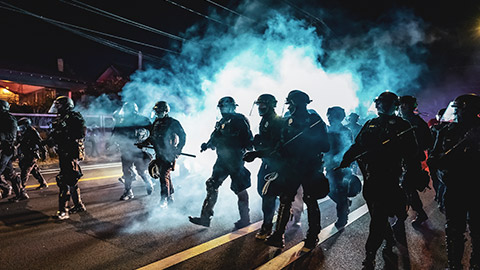In this topic, we will consider how legal and political systems impact global businesses. We will define the legal and political environments and you will learn how to describe these. As businesses expand their operations, country risk is an important aspect to consider. Country risk looks at how the firm could be negatively impacted by political or legal instability or changes.
Welcome to Topic 3: Legal and Political Considerations for Operating a Global Business. In this topic, you will learn about:
- What legal and political environments constitute and how they can be described
- What country risk is
- How the legal and political systems can impact on the business environment.
These relate to the Subject Learning outcomes:
- Explain the impact of globalisation on the business environment.
- Outline how global businesses are affected by the type of environment (legal, political, economic, financial and social-cultural) they operate in.
Welcome to your pre-seminar learning tasks for this week. Please ensure you complete these prior to attending your scheduled seminar with your lecturer.
Click on each of the following headings to read more about what is required for each of your pre-seminar learning tasks.
Read Cui, L, Hu, W, Li, L & Meyer, K, 2018 ‘Corporate Political Connections in Global Strategy’, Global Strategy Journal, 8(3): 379-398.
In your reflective journal, note down the three (3) main political impacts for global business based on the reading.
You can access the reflective journal by clicking on ‘Journal’ in the navigation bar for this subject.
Read through this week’s topic content.
Assessment 1 – If you were allocated this week by your lecturer, you will need to co-facilitate the discussion on the discussion forum as per the assessment instructions provided. You can access the activities by clicking on 'Topic 3: Assessment 1: Facilitation & participation.' You can also navigate to the forum by clicking on 'BUS100 Assessment 1 Forum' in the navigation bar for this subject.
Assessment 1 – For all students not allocated a facilitation task this week, you are expected to actively participate in the class discussion and respond to peer facilitation. You can access the activities by clicking on 'Topic 3: Assessment 1: Facilitation & participation.' you can also navigate to the forum by clicking on 'BUS100 Assessment 1 Forum' in the navigation bar for this subject.

The legal and political environment
Increasingly we are seeing the impacts of political tensions between countries on international business. Let us begin by looking into what the legal and political environment consists of and how it can be described.
Learning task 1: managing geopolitical risk
The following article provides some valuable insights into how the political tensions between countries can impact on businesses, as well as suggesting how these risks might be managed.
Grant, A, Haider, Z & Levy, A 2021, ‘How global companies can manage geopolitical risk’, McKinsey.
Task: Read through the article and note down two (2) things in your reflective journal which you did not know before.
Political system
A political system is the collective of formal institutions that make up a government. These institutions include:
- legislative bodies
- political parties
- trade unions
- lobby groups.
The main aim of a political system is to look after the countries interests and provide protection from external threats. The system is responsible for looking after stability through a system of laws and regulations. The political system is also responsible for looking after and allocating the country's resources amongst its members. Finally, a political system defines the way in which its members interact with one another.
All countries have a unique political system that has evolved based on their individual historical, socio-cultural and economic context.
Constituents are people and organisations who support the political system and who are protected by or receive government resources.
There are three main types of political systems, these include:
- Authoritarianism
- Socialism
- Democracy.
To understand more about authoritarianism and the impact it might have, the following video provides a brief overview.
To explore the differences between socialism and capitalism, watch the following video.
Contemplate
How might different political systems make it attractive or risky for organisations to expand their operations?Legal system
A legal system is a system for interpreting and enforcing the law and regulation. It provides a framework that determines the norms of conduct and punishes those who violate the laws and regulations. The political system influences the legal system.
The aims of a legal system are to ensure order, to resolve any disputes that may arise in terms of civil and commercial interactions, to tax the country’s economic activity. And lastly, the legal system provides protection for private property, intellectual property and other assets that a business may own. Assets are items of value that are owned by a company these can be physical or tangible goods or intangible items such as intellectual property.
Key impact areas for businesses are:
- Who owns the intellectual property and how this is determined
- The way contracts and agreements are enforced and how specific they are under the country’s legislation
- How non-compliance with these contracts is viewed.
Country risk assessment

When businesses consider their international operations, country risk (sometimes referred to as political risk) is defined as the potential negative impacts on an organisation due to political and/or legal developments within a country.
The following are examples of factors which, if present, can adversely impact businesses:
- A harmful or unstable political system
- An inadequate or underdeveloped legal system
- Any current laws and regulations that are unfavourable to foreign firms operating in a host country. (Impending legislation also needs to be considered here.)
- Significant bureaucracy and red tape present
- Increased levels of government intervention
- Sanctions currently in place, or impending
- Corruption and ethical issues are commonplace
- Any mismanagement or imminent failure of the country’s national economy
- Any issues regarding the cancellation of licenses
- Any other barriers to trade.
In more concrete terms, examples of country risk that could impact upon global businesses are political violence (civil war, coup d'états, strikes, riots and terrorism), which could cause physical damage to assets or injure or endanger employees. This could lead to interruptions to operations due to a lack of staff availability, or not being able to access a headquarter or subsidiary.
In countries where there is much government interference, issues may include the renegotiation of contracts or concessions, which were previously negotiated and agreed upon. Similarly, governments may withdraw or cancel previous issues licenses that allowed the business to operate in the host country. Imposing bans or sanctions targeted at foreign companies are another negative impacts that companies may face.
Further examples of country risk that are determined through the political and legal systems include the introduction of a new import tariff that may increase the cost of goods and services and make it less attractive to global businesses to import manufacturing components. When a new government or political leader with a lot of power is installed in a country this could lead to a government takeover of corporate assets. Changes in labour legislation could impact employee compensation or the number of hours employees may work for example.
Country risk can ultimately result in a financial loss for the organisation and reduce or eliminate its success in operating in a host country. Where the impacts are extreme it may negate any positive gains that motivate the internationalisation of the business in the first place.
Knowledge check
Complete the following two (2) tasks. Click the arrows to navigate between the tasks.
Key Takeouts:
Congratulations, we made it to the end of the third topic! Some key takeouts from Topic 3:
- A political system is the collective of formal institutions that make up a government. These institutions include:
- legislative bodies
- political parties
- trade unions
- lobby groups.
- A legal system is a system for interpreting and enforcing the law and regulation. It provides a framework that determines the norms of conduct and punishes those who violate the laws and regulations.
- Country risk is the potential negative impact on a business due to political and/or legal developments within a country.
- Country risk can ultimately result in a financial loss for the organisation and reduce or eliminate its success in operating in a host country
Welcome to your seminar for this topic. Your lecturer will start a video stream during your scheduled class time, you can access your scheduled class by clicking on ‘Live Sessions’ found within your navigation bar and locating the relevant day/class or by clicking on the following link and then click 'Join' to enter the class.
Click here to access your seminar.
The learning tasks are listed below, these will be completed during the seminar with your lecturer. Should you be unable to attend, you will be able to watch the recording which can be found via the following link or by navigating to the class through ‘Live Sessions’ via your navigation bar.
Click here to access the recording. (Please note: this will be available shortly after the live session has ended.)

In-seminar learning task
The in-seminar learning tasks identified below will be completed during the scheduled seminar. Your lecturer will guide you through the task. Click on the following heading to read more about the requirement for your in-seminar learning task.
Your lecturer will allocate countries to different breakout groups. As a group you will research the legal and political systems in the allocated country and summarise potential country risks. Groups will post to 'Topic 3: Forum Activity 1'.
Welcome to your post-seminar learning tasks for this week. Please ensure you complete this task after attending your scheduled seminar with your lecturer. Your lecturer will advise you if the task is to be completed during your consultation session. Click on the following heading to read more about the requirement for your post-seminar learning task.
Assessment 2 – Do additional research for your case study analysis. Be prepared to explain what you have found and what your next steps will be in the consultation session with your lecturer.
Each week you will have a consultation session which will be facilitated by your lecturer. You can join in and work with your peers on activities relating to this subject. These session times and activities will be communicated to you by your lecturer each week. Your lecturer will start a video stream during your scheduled class time, you can access your scheduled class by clicking on ‘Live Sessions’ found within your navigation bar and locating the relevant day/class or by clicking on the following link and then click 'Join' to enter the class.
Click here to access your seminar.
Should you be unable to attend, you will be able to watch the recording which can be found via the following link or by navigating to the class through ‘Live Sessions’ via your navigation bar.
Click here to access the recording. (Please note: this will be available shortly after the live session has ended.)

- Economist Intelligence, n.d., Latest White Papers Posts, The Economist Intelligence Unit Limited.
- Marsh 2021, Marsh political risk mid-year update 2021, Marsh McLennan.
References
- Cavusgil, S, Knight, G & Riesenberger, J 2019, International business: The new realities, Global edn., 5th edn., Pearson International Content.
- Cui, L, Hu, W, Li, L & Meyer, K, 2018 ‘Corporate political connections in global strategy’, Global Strategy Journal, 8(3): 379-398.
- Collinson, S, Narula, R, Rugman, A & Qamar, A 2020, International Business, 8th edn., Pearson Publishing.
- Grant, A, Haider, Z & Levy, A 2021, How global companies can manage geopolitical risk, McKinsey & Company, https://www.mckinsey.com/business-functions/risk-and-resilience/our-insights/how-global-companies-can-manage-geopolitical-risk
- Investopedia, 2021, What is socialism?, streaming video, Investopedia, https://www.investopedia.com/terms/s/socialism.asp
- Social Science Research, 2018, Understanding what authoritarianism is, streaming video, YouTube, https://www.youtube.com/watch?app=desktop&v=n1tXjJobjfs&feature=youtu.be

